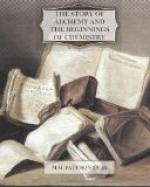The object of their search was to satisfy their material needs, their intellectual capacities, and their spiritual yearnings. The alchemists of the nobler sort always made the first of these objects subsidiary to the other two; they gave as their reason for desiring to make gold, the hope that gold might become so common that it would cease to be sought after by mankind. The author of An Open Substance says: “Would to God ... all men might become adepts in our art, for then gold, the common idol of mankind, would lose its value, and we should prize it only for its scientific teaching.”
But the desire to make gold must always have been a very powerful incentive in determining men to attempt the laborious discipline of alchemy; and with them, as with all men, the love of money was the root of much evil. When a man became a student of alchemy merely for the purpose of making gold, and failed to make it—as he always did—it was very easy for him to pretend he had succeeded in order that he might really make gold by cheating other people. Such a man rapidly degenerated into a charlatan; he used the language of alchemy to cover his frauds, and with the hope of deluding his dupes by high-sounding phrases. And, it must be admitted, alchemy lent itself admirably to imposture. It promised unlimited wealth; it encouraged the wildest dreams of the seeker after pleasure; and over these dreams it cast the glamour of great ideas, the idea of the unity of nature, and the idea of communion with other spheres of life, of calling in the help of ‘inheritors of unfulfilled renown,’ and so it seemed to touch to fine issues the sordidness of unblushing avarice.
Moreover, the working with strange ingredients and odd-fashioned instruments, and the employment of mouth-filling phrases, and scraps of occult learning which seemed to imply unutterable things, gave just that pleasing dash of would-be wickedness to the process of consulting the alchemist which acts as a fascination to many people. The earnest person felt that by using the skill and knowledge of the alchemists, for what he deemed a good purpose, he was compelling the powers of evil to work for him and his objects.
It was impossible that such a system as alchemy should appear to the plain man of the middle ages, when the whole scheme of life and the universe rested on a magical basis, to be more than a kind of magic which hovered between the black magic of the Sorcerer and the white magic of the Church. Nor is it to be wondered at that a system which lends itself to imposture so easily as alchemy did, should be thought of by the plain man of modern times as having been nothing but a machinery of fraud.
It is evident from the Canon’s Yeoman’s Tale in Chaucer, that many of those who professed to turn the base metals into gold were held in bad repute as early as the 14th century. The “false chanoun” persuaded the priest, who was his dupe, to send his servant for quicksilver, which he promised to make into “as good silver and as fyn, As ther is any in youre purse or myn”; he then gave the priest a “crosselet,” and bid him put it on the fire, and blow the coals. While the priest was busy with the fire,




